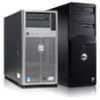Dell PowerEdge SDS 100 Improving NFS performance on HPC clusters with Dell Flu - Page 6
Introduction, 1.1. Dell Fluid Cache for DAS (direct-attached storage)
 |
View all Dell PowerEdge SDS 100 manuals
Add to My Manuals
Save this manual to your list of manuals |
Page 6 highlights
Improving NFS Performance on HPC Clusters with Dell Fluid Cache for DAS 1. Introduction A Network File System (NFS) based storage solution is a popular choice for High Performance Computing Clusters (HPC). Most HPC clusters use some form of NFS irrespective of the size of the cluster. NFS is simple to configure and administer, free with virtually all Linux distributions, welltested, and can provide reliable storage for user home directories and application data. A well-tuned NFS solution can provide great performance for small to mid-sized clusters.1 Nearline SAS (NL SAS) drives provide large capacity and good performance for a reasonable price, optimizing the GB/$ metric. However, they limit performance for applications that have random I/O patterns.2 Dell Fluid Cache for DAS (Direct Attached Storage) reduces this limitation by caching data while the backend storage services the I/O request, thus improving the performance of the entire NFS storage solution. This study evaluates Dell Fluid Cache for DAS (DFC) 3 with NFS for HPC clusters. A cluster-level study was conducted to analyze different I/O characteristics and quantify the performance improvements gained with DFC when compared to the same NFS configuration without using DFC. All the results presented in this document are measured results that were obtained in the Dell HPC laboratory. The following section introduces the DFC technology. Subsequent sections describe the design of the storage solution and the tuning optimizations applied to the solution. Information is provided on tools that can be used to monitor the solution. An analysis of the performance results follows. The paper concludes with recommendations on best-fit use cases for DFC with NFS. Two appendices that provide step-by-step instructions on how to configure such a solution and provide information on the benchmarks and tests that were run for this study complete this document. 1.1. Dell Fluid Cache for DAS (direct-attached storage) DFC is a write-back host caching software. DFC combines multiple Dell PowerEdge™ Express Flash PCIe SSDs to provide a read and write cache pool. This PCIe SSD cache pool is used to accelerate response times with significant improvements in I/O operations per second (IOPS). Some features of the DFC software include: • Faster cache reads, writes, read-after-writes, and re-reads • Data protection as writes are replicated across multiple PCIe SSDs • Orderly hot swap and hot plug capability that allows adding or removing a device without halting or rebooting the system More details on the Dell Fluid Cache for DAS technology can be found at [3]. In an HPC context, the DFC software can be configured on a NFS server. PCIe SSDs on the NFS server will provide the virtual cache pool. 2. Solution design and architecture This section describes the NFS storage solution used to evaluate the DFC technology. The baseline for comparison is an NFS server with direct-attached external SAS storage. The configuration of this NFS server is augmented with PCIe SSDs and DFC software for the DFC comparison. A 64-server Dell PowerEdge cluster was used as I/O clients to provide I/O load to the storage solution. The following 6















